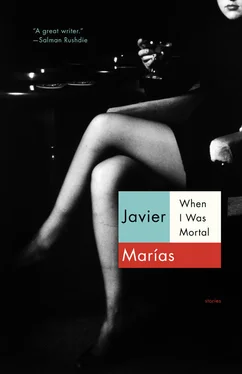Shortly after this, he suffered a series of setbacks and changes in his life, although he informed me of them only gradually, doubtless out of a sense of tact. He only told me that he’d separated from Eliane some time after it had happened. He didn’t explain anything to me outright but, during a conversation — this time in Madrid where he was on a visit to a brother who’d moved there — he implied that there were four reasons: the death of a child doesn’t necessarily bring people together, it can also drive them apart if the face of the other is a constant reminder of the death of that child; the years of waiting for something concrete to happen — a book and its publication — can be shattered when the long-awaited event actually takes place; whilst anything that begins in childhood is never truly over, neither does it ever truly reach fulfilment; with regard to your own pain, you have no option but to put up with it, what you can’t do is to expect us to watch while you inflict pain on yourself, because we will never accept it as necessary. The break-up of his marriage did not, of course, mean the end of his adoration: Xavier hoped that the divorce would take a long time and that Eliane would stay on in Paris, even though she’d been offered an excellent job as an interior designer in Montreal.
Later on, he told me that the inheritance or private income he lived on had dried up (perhaps his father had been diverting money from the family business but had now grown tired of doing so). Up until then, Xavier’s only paid work had been his monumental translation of Burton’s Anatomy of Melancholy , of which he had still not completed even fifty per cent; he had no concept of schedules nor, of course, of getting up early. However, he decided to return to his original, neglected profession and took the necessary steps to do so in Paris, which he still had no desire to leave as long as Eliane remained there. While he waited to be given French nationality and to have his qualifications validated, he had to work as a nurse and, subsequently, in a clinic (“men and women, old people and adolescents, like so much plumbing: I go there to arbitrate amongst the horrors and the trivia”). He almost joined Médecins du Monde or Médecins sans Frontières, organizations that would have sent him off to Africa or to Central America for a while, with all expenses paid but with no salary, which would have meant returning with empty pockets. Now that he couldn’t spend all his free time writing, the pace at which he was able to work towards his famous one hundred per cent had slowed considerably. He didn’t much like talking about Eliane, he preferred to talk about other women, young and not so young, amongst them my Italian friend to whom I’d introduced him some years before. According to his version of events, she’d been very cruel to him; according to her version, she’d simply acted in self-defence. It seems that after spending one night together, he’d left her house only to return a few hours later with his luggage, all set to move in. She threw him out in high female dudgeon. I listened to both versions and offered no opinion, merely regretting that it had happened.
He was now no longer an unpublished author but, as expected, his novel didn’t sell in Spain and was reviewed almost nowhere. When I went to Paris, we used to arrange to have supper or lunch at Balzar or at Lipp, and that didn’t change, but now he allowed me to pay for him whereas before, he’d always imposed the law of hospitality: you’re a stranger and you’re in my city. He still dressed well — I remember he often wore a particularly smart raincoat — as if that were something his breeding would not allow him to give up; it was, perhaps, the only characteristic he’d inherited from his father. Now, however, the colours he wore were not so splendidly coordinated, as if that had always been dependent on Eliane’s exquisite taste in anything to do with adornment. He mentioned her only once in a letter: “From the severed root with Eliane furious lightning shoots sprout forth, draining away half my life.” We didn’t see each other for two years and when I saw him again after that time, his physical appearance had changed somewhat and, with his usual tact, he forewarned me: “I’m not only worn out mentally, I’m also in terrible physical shape. A witness to this is the galloping alopecia that obliges me to wear a cap to protect me from the ill-tempered autumns we get in this part of the world.” He’d had to move to a largely North African quarter. On one of my trips to Paris, I phoned him but got no reply, although I knew he was in town. Thinking that perhaps his phone had been cut off, I caught the Metro and arrived at his remote and unfamiliar new house, or rather, what turned out to be a room, tiny and sparsely furnished, a final desolate stopping place. But, in fact, all I remember of that scene was the look of happiness on his face when he opened the door to me. On his desk was a glass of wine.
Things improved for him somewhat while I was away, travelling to Italy rather than to Paris. Xavier had at last found the perfect job for his purposes, although, accordingly, it earned him little money: he got a job as a locum in a hospital, working more or less only when he wanted or needed to. As long as he worked a certain minimum number of hours per month, he could then increase those hours depending on how energetic he was feeling and on how much money he needed and this freed him to hurry impatiently on towards the completion of his literary work. I never really understood this impatience, bearing in mind that, since Vivisection , nothing else of his had been published. His novel Hecate , the book entitled The Edgeless Sword , his Treatise on the Will , the poems he sometimes sent me, none of these was ever successful in finding a publisher. I remember two lines from one of his “night watches”: “The wakefulness of your geminate soul/is the sleep which I, mere body, deny myself.” Whilst everything he wrote remained extremely obscure, it nevertheless had a certain verve. I read very little of what he was writing and he was still engaged on translating Burton’s Anatomy of Melancholy .
One morning — by then we’d known each other for about ten or eleven years — we were once again sitting on the covered terrace of a café in St-Germain. He’d acquired a certain nobility of appearance and had discovered a way of combing his thinning hair, which did not look thin so much as lighter in colour. He seemed in good spirits after the misfortunes of recent years and he told me about the enormous progress he’d made in his writing. He had, he said, borrowing my ironic tone, completed eighty-three point five per cent of his entire body of work. Then he put on his confidential face and grew more serious: he had only two texts to complete now, a novel to be entitled Saturn and the long-postponed essay on pain. Given the novel’s technical complexities, he would leave that to last and he now felt strong enough to return to his experiment and again stop taking his medication. He thought that, this time, he’d be able to last out long enough and be able to start writing as soon as he’d learned whatever it was he needed to learn. “Over the past few years working in my profession I’ve seen a lot of pain, I’ve even controlled it; I’ve both fought it and permitted it, according to what was in the patient’s best interests; I’ve suppressed it completely with morphine, as well as with other medications and drugs that can’t be found on the open market and to which only doctors have access. Many are as closely guarded as state secrets; what you can buy in pharmacies and dispensaries is only a tiny fraction of what’s available, but there’s a black market in everything. I’ve seen pain now, I’ve observed it, gauged it, measured it, but now it’s my turn to suffer it again, and not only physical pain, which is commonplace enough, but psychic pain, the pain that makes the thinking brain want only to stop thinking, but it can’t. I’m convinced that consciousness is the source of man’s greatest suffering and there’s no cure for it, no way to blunt it, the only end is death, though even that you can’t be sure of.” This time I didn’t try to dissuade him, not even in the oblique, jokey way I had when he first announced his intention of embarking on this personal research. We had too much respect for each other and so I just said: “Well, keep me posted.”
Читать дальше












